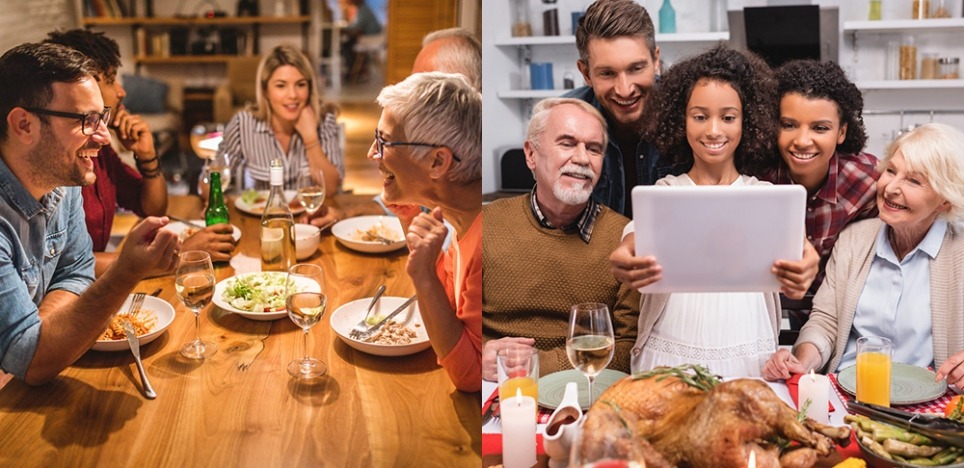Editors' Update: November 2023. The holidays are upon us again, and we are still living in extraordinarily divisive times. The conflict between Israel and Palestine is reverberating worldwide and stretching into our most intimate relationships, while in the United States (and other places) major political races are heating up. The future is uncertain, and it can be hard to stay grounded.
So, before you pass the mashed potatoes, take a pass at these practices. And remember that you don't have to dive into the divisiveness at all. Settling on neutral ground may be just the self-care you (and your family) need for these precious days off of school and work!
Background on How This Article Was Developed
In June 2018, Spirituality & Practice and our partners for The Practicing Democracy Project, the Fetzer Institute, convened a gathering of 24 spiritual leaders at Fetzer's Seasons retreat center in Michigan. The leaders represented a spectrum of religious and spiritual traditions. Our intention was to bring the wisdom and practices of our respective paths to bear on the challenge of reinvigorating the U.S. democracy.
Along with mealtime and evening informal conversations and group experiences of spiritual practices, the participants brainstormed in small groups how they could "practice democracy" in specific scenarios. The sharing of the small groups' comments with the whole group was recorded. From the transcripts of those conversations, we've collected their ideas. We have now gone through Spirituality & Practice's collection of spiritual practices to find matches to their suggestions for each scenario.
Scenario
“You are attending a family or school reunion. You know that those attending will be in different places on the political spectrum and will have different degrees of interest in what is happening to our democracy. How will you react? What practices will facilitate communication, especially across divides? What is more important — sticking up for what you believe or the unity of those participating?
"What if you learn that someone is indifferent, apathetic, or cynical about what is happening? This person may be disillusioned after having been involved in politics or burned out from past activities. They may despise authority and have no confidence that the system can be made to work for the benefit of the people. Or, perhaps the person doesn't see any point in voting or being involved. What spiritual practices influence your response to this person? What practices could you use to motivate them to participate, to reengage, to rethink, or to reframe?”
Using this scenario as a starting point, the spiritual leaders at the convening asked, how does one begin to hold conversations about politics across a family dinner table? At a family reunion? A school reunion? What does someone do when they know that there will be a spectrum of political beliefs, or maybe even a lack of interest in engaging with the topic at all. This feature outlines the suggestions from the convening and suggests jumping off points for these conversations — from grounding yourself before you begin, to storytelling, to simply making sure that the conversation is held over good food.
- Do some grounding work. Reflect on who you are and where you are today with a contemplation on interdependence. Center down with exercises such as humming or accessing the body's knowing.
- Discern whether or not you will set some limits on your conversation at this particular gathering. What is the purpose of the get-together? Is this a time to talk about political views? Will the topic come up anyway, no matter how you plan the event?
- Make a toast to your ancestors and recognize your extended family, past, present and future.
- Set the intention to approach the conversation with curiosity, not the intent to change minds, and to participate from your heart level.
During:
- If appropriate for your group, have some “bitching time" beforehand when you let everything out on the table, being raw and real about the issue. Then share a meal with some good food. Come back to the conversation with the intent to really listen to each other.
- Tell stories. You can learn a lot about people from hearing about their lives, including an event or person which influenced what they believe and support. But try to learn about the whole person, not just their politics. Ask open-ended questions to get people talking.
- Practice active listening.
- Address any cynicism in the group by offering a different perspective.
- Examine the roots of any anger or frustration you bring to the conversation.
- Practice humility.
- Watch your language. Disarm your tongue! Avoid words that stereotype and demonize others, thus creating separation.
- When in doubt, pause before responding.
- Be open to all present, even those who have offended you by remembering the distinction between someone's behavior (or words) and their being.
- Look for ways to work together for the common good.
- Turn confrontations into "carefrontations" in which you can honestly say, "I love you, but I could not disagree with you more . . . I care about this issue and I care about you." Look for the secret goodness in others.
- End the gathering with a blessing to celebrate peaceful diversity.
After:
- Acknowledge that you have had an experience where diverse views have been expressed. Look for ways to honor the dignity of differences as you seek a genuine feeling of unity with others.
- Don't leave the conversation thinking that talk is enough. Take what you have learned from each other and find ways to put it into action — volunteering, voting, organizing, protesting, calling your representatives. Expressing righteous indignation and speaking truth to power are spiritual practices too.
